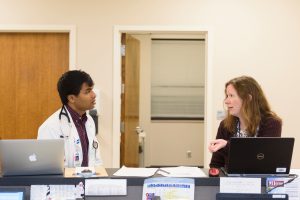
TUSCALOOSA, Ala. – Beginning this fall, The University of Alabama’s College of Arts and Sciences will offer a new minor in global health, which will allow students to get a holistic, thorough look at health disparities and issues in communities around the world.
“People are traveling all over the world every day,” said Dr. Lisa Pawloski, associate dean of international programs and professor of anthropology in UA’s College of Arts and Sciences. “We really need to have a good understanding of what’s happening around the world to understand what’s happening in our own communities.”
The minor, offered through the department of anthropology, will challenge students to look at health from a community level, taking into account politics, economics, cultures and religions of a population while evaluating health concerns. Because its interdisciplinary, students will take courses in several different fields, ranging from health behavior to medical anthropology to statistics with an option to explore the history of epidemics.
The global health minor will also require students to participate in a study abroad or experiential learning opportunity. According to Pawloski, this is imperative because it allows students to learn the course material while gaining hands-on experience in a culture different from their own, whether across the ocean or within the state.
“One exciting thing about global health is that you get to cross cultural boundaries, and students are able to do that abroad or here in the United States,” Pawloski said. “Students can spend time learning about urban, rural, immigrant and Native American populations, which allows students to interact with a culture different from their own.”
As students complete the minor, Pawloski wants them to better understand how health intertwines with many different entities, from cultural values to economics. She also hopes students see how the world is connected.
“Our current COVID-19 situation is an example of global health at work,” Pawloski said. “You have physicians and doctors in hospitals who are treating individuals with COVID-19 and have a medical background, but the global health people are out there trying to understand the associated comorbidities. Why does it seem more prevalent in men than women? Why did it spike in Italy, but not yet in Greece? These are the kinds of questions a lot of physicians want to better understand because those answers help their practice.”
The minor was created by UA’s College of Arts in Sciences in partnership with Education Abroad and College of Human Environmental Sciences, and includes courses within the College of Education and Culverhouse College of Business.
For more information, contact Dr. Lisa Pawloski at lpawloski@ua.edu.
Contact
Bryant Welbourne, UA Strategic Communications, bryant.welbourne@ua.edu
Source
Dr. Lisa Pawloski, associate dean of international programs and professor of anthropology in UA’s College of Arts and Sciences, lpawloski@ua.edu
